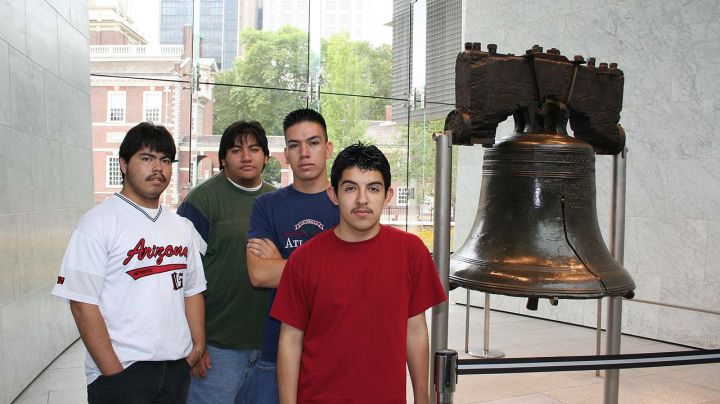Undocumented Teen Roboticist Surmounted the Odds, But Our Immigration System Let Him Down

The team from Carl Hayden Community High School in Phoenix is pictured, Lorenzo Santillan, Luis Aranda, Oscar Vazquez, and Christian Arcega. This image is in the public domain.
In 2004, Lorenzo Santillán competed with an award-winning robotics team from Phoenix’s Carl Hayden Community High School. Santillán and his three teammates – all of whom were undocumented – went up against and defeated accomplished teams, including one from Massachusetts Institute of Technology (MIT). Though he and his teammates’ inspiring story became the subject of a documentary (Underwater Dreams) and feature film (Spare Parts), Santillán didn’t go on to accomplish his dream of becoming a mechanical engineer. As an undocumented immigrant entering college before the Deferred Action for Childhood Arrivals (DACA) – which affords certain protections to immigrants brought to the United States at a young age – program went into effect, Santillán wasn’t eligible for scholarships. Additionally in the mid-aughts, Arizona passed Proposition 300, which barred undocumented students from receiving any state financial aid or in-state tuition. But because of the generous donations from people moved by his story, Santillán became a chef.
“We received funds from people all over the world. They gave us $100,000 in donations, and since we were four students,” he told EFE. “I got $25,000 – that was my scholarship to study cooking, and I didn’t have to be a citizen to get it.”
He now operates a food truck called Ni de Aqui, Ni de Alla with his former teammate Luis Aranda. They launched a catering service this year. Though he’s now determined to show the complexity of Mexican food and he’s persevering, our draconian immigration laws let him down. The same goes for his teammates.
In a 2015 New York Times article titled “The Cruel Waste of America’s Tech Talent,” Joshua Davis – whose reporting on Santillán, Aranda, Oscar Vazquez, and Cristian Arcega led to the Spare Parts film – notes they were true underdogs. Their school didn’t have a pool and they competed in an underwater robotics competition. The team made robots out of everyday items they found and garbage. Other teams had corporate sponsors, and still, Santillán, Vazquez, Arcega, and Aranda won. However, some of the contestants they defeated ended up at tech companies and research centers. The four students, however, couldn’t pay tuition.
While their paths wildly differed after high school, these four men are an example of the talent the US may be stifling through its broken immigration system. In the years that followed their graduation from high school, young undocumented students made some leaps forward. In 2012, DACA began. And while the program has plenty of flaws and didn’t make college easier to access for the entire undocumented community, in-state tuition did become available in a few states. And very importantly, a set of undocumented immigrants suddenly became eligible for two-year work permits. In 2015, a judge ruled that students living in Arizona with DACA were eligible for state benefits. However, this year both DACA and the 2015 decision have faced roadblocks.
Just this week, the Arizona Court of Appeals overturned the 2015 decision. Citing the Personal Responsibility and Work Opportunity Reconciliation Act, Illegal Immigration Reform and Immigrant Responsibility Act, and Prop 300, Judge Kenton Jones – who wrote the opinion – said the court couldn’t grant DACA recipients in-state tuition.
Meanwhile, the future of DACA hangs in the balance. A week ago, several outlets announced that DACA would remain in place. But by Friday, the Department of Homeland Security stated that the Trump administration hadn’t definitively decided. “The future of the DACA program continues to be under review with the administration,” a DHS spokesperson said, according to Politico. “The president has remarked on the need to handle the issue with compassion and with heart.”
There is a lot of uncertainty about what the future holds for DACA recipients in Arizona and around the country, but one thing’s undeniable, if the United States continues to move backward on this issue, there will be more cases like Santillán – promising, talented individuals who will find it difficult to accomplish their goals.